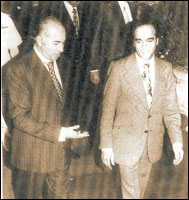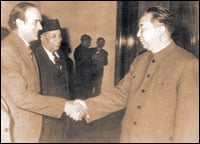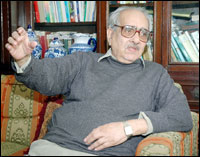Mir
Khalil-ur-Rehman, a legend who is no more with us, will always be
remembered as the father of journalism in Pakistan. In an interview with 'The News' Jamiluddin Aali, prominent poet, educationist,
scholar and columnist shared his fond memories of the time he spent
with Mir Saheb and shed light on his professional and personal life.
Mir Saheb was a self-made person, who had no inhibition about doing
manual work. Neither was he born with a silver spoon in his mouth
nor did he ever have the support of affluent godfathers. He started
the 'Jang' with faith in God. In the early days of "Jang' I often
saw him bicycling his way to the hawkers to hand-deliver the newspaper
which he carried on the back of his cycle.
an interview with 'The News' Jamiluddin Aali, prominent poet, educationist,
scholar and columnist shared his fond memories of the time he spent
with Mir Saheb and shed light on his professional and personal life.
Mir Saheb was a self-made person, who had no inhibition about doing
manual work. Neither was he born with a silver spoon in his mouth
nor did he ever have the support of affluent godfathers. He started
the 'Jang' with faith in God. In the early days of "Jang' I often
saw him bicycling his way to the hawkers to hand-deliver the newspaper
which he carried on the back of his cycle.
Mir Saheb remained in constant contact with his workers. Throughout
his career he always met up with the hawkers first and then the reporters,and
finally would meet the advertisers. Aali Saheb says "a friend
should not do the job of a friend" but when Mir Saheb started
the 'Jang' publication from London, he asked me to join in as the
advisor for the paper and after several discussions with him I took
the job. It was after this job assignment that we became very closely
associated with each other.
Mir Saheb believed in free and fair reporting. Even during Ayub Khan's
regime, when he had to face immense pressure from the government,
he never asked his reporters to exercise restraint. He said "Report
the truth, it is my duty to protect you." He always protected
his staff from the government's wrath.
He was often pressurised by the government not to print certain news
or to delete some sentences, but he boldly refused to compromise on
Jang's right to expose the wrongdoings of the government.
Sometime after the Iraqi Revolution a stanza (qata) about the Iraqi
Revolution was published in the 'Jang'. It was written by Raees Amrohi.
The government immediately objected to it and threatened to ban the
publication of the 'Jang'. Prior to this incidence the publication
of 'Pakistan Times' and 'Imroz' had already been banned. At that time
I was working in the president house. I called Mir Saheb and advised
him to get two to three similar stanzas written in the next consecutive
issues so that they seemed to be a part of sequence.
In the meantime, I wrote to Ayub Khan that the said poetry did not
aim to provoke anti-government sentiments but was actually a series
of poetry, which was against violence. In this manner we succeeded
to convince the government and saved Jang from getting banned.
Mir Saheb made an effort to be involved in all stages of newspaper
production. He supervised the activities of his editors closely but
never interfered with their work. At least once a week he wrote an
editorial. Apart from this he also helped in the placement of news
in the newspapers to keep himself abreast of the latest happenings.
Mir Saheb was a friend to his staff and was easily accessible to any
employee any time. In his personal life Mir Saheb was an extremely
down-to-earth person. He drove himself around and would say: "you
should drive your car yourself". He often got fined too but he
paid the fine without any argument.
He remained modest throughout his life. Even when Jang Group's fortunes
soared, Mir Saheb never spent lavishly on himself. On the contrary
he did not refrain from spending money to acquire new technology for
the improvement of his newspaper.
Mir Khalil-ur-Rahman was a man of substance. He was unbiased in his
professional life and never compromised on principles. He is a source
of inspiration for all those who wish to start their career in journalism.
|

